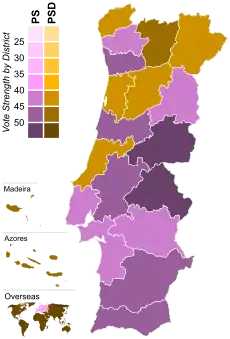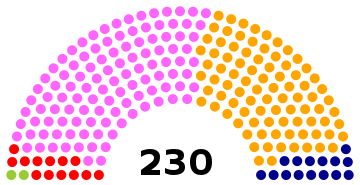1995 Portuguese legislative election
The Portuguese legislative election of 1995 took place on 1 October. The election renewed all 230 members of the Assembly of the Republic.
| ||||||||||||||||||||||||||||||||||||||||||||||||||||||||||||||||||||||||||
230 seats to the Portuguese Assembly 116 seats needed for a majority | ||||||||||||||||||||||||||||||||||||||||||||||||||||||||||||||||||||||||||
|---|---|---|---|---|---|---|---|---|---|---|---|---|---|---|---|---|---|---|---|---|---|---|---|---|---|---|---|---|---|---|---|---|---|---|---|---|---|---|---|---|---|---|---|---|---|---|---|---|---|---|---|---|---|---|---|---|---|---|---|---|---|---|---|---|---|---|---|---|---|---|---|---|---|---|
| Registered | 8,906,608 | |||||||||||||||||||||||||||||||||||||||||||||||||||||||||||||||||||||||||
| Turnout | 5,904,854 (66.3%) | |||||||||||||||||||||||||||||||||||||||||||||||||||||||||||||||||||||||||
| ||||||||||||||||||||||||||||||||||||||||||||||||||||||||||||||||||||||||||
 Results by district or autonomous region. | ||||||||||||||||||||||||||||||||||||||||||||||||||||||||||||||||||||||||||
| ||||||||||||||||||||||||||||||||||||||||||||||||||||||||||||||||||||||||||
The incumbent Prime Minister, Aníbal Cavaco Silva, decided not to run for a fourth consecutive term[5] and the Social Democratic Party, choose Fernando Nogueira, one of Cavaco Silva's deputies, as leader and candidate for Prime Minister in a highly contested and bitter party congress in February 1995.[6] But, the PSD was weakened by the end of the 10-year cycle of governments led by Cavaco Silva, amid scandals and the 1994 25 April bridge riots that shocked the country.[7] During the campaign, Cavaco Silva toyed with the idea of running for the 1996 Presidential elections, which he ultimately did.[8]
The PS easily won the elections with 44% of the votes, against the 34% of the PSD, achieving their first general election victory since 1983 and after a decade in opposition, but missed the absolute majority by 4 MPs. António Guterres, elected as PS leader three years before, became Prime Minister. The Social Democratic Party suffered a heavy defeat, losing almost 50 seats and 17% of the votes. This election marked the growing bi-polarization of the Portuguese political map. The two minor parties, the People's Party and the Democratic Unity Coalition (CDU) achieved only 15 MPs each, and for the first time ever the CDU failed to win a single district.
Although turnout, in percentage point, was lower than the previous election in 1991, almost 6 million voters cast a ballot on election day, the highest figure since 1980. Voter turnout stood at 66.3%, the lowest until then.
Electoral system
The Assembly of the Republic has 230 members elected to four-year terms. Governments do not require absolute majority support of the Assembly to hold office, as even if the number of opposers of government is larger than that of the supporters, the number of opposers still needs to be equal or greater than 116 (absolute majority) for both the Government's Programme to be rejected or for a motion of no confidence to be approved.[9]
The number of seats assigned to each district depends on the district magnitude.[10] The use of the d'Hondt method makes for a higher effective threshold than certain other allocation methods such as the Hare quota or Sainte-Laguë method, which are more generous to small parties.[11]
For these elections, and compared with the 1991 elections, the MPs distributed by districts were the following:[12]
| District | Number of MPs |
|---|---|
| Lisbon | 50 |
| Porto | 37 |
| Setúbal | 17 (+1) |
| Braga | 16 |
| Aveiro | 14 |
| Leiria | 10 |
| Santarém | 10 |
| Coimbra | 10 |
| Viseu | 9 |
| Faro | 8 |
| Viana do Castelo | 6 |
| Madeira | 5 |
| Azores | 5 |
| Vila Real | 5 (-1) |
| Castelo Branco | 5 |
| Guarda | 4 |
| Bragança | 4 |
| Évora | 4 |
| Beja | 4 |
| Portalegre | 3 |
| Europe | 2 |
| Outside Europe | 2 |
Parties
The table below lists the parties represented in the Assembly of the Republic during the 6th legislature (1991-1995) and that also partook in the election:
| Name | Ideology | Political position | Leader | 1991 result | |||
|---|---|---|---|---|---|---|---|
| Votes (%) | Seats | ||||||
| PPD/PSD | Social Democratic Party Partido Social Democrata |
Liberal conservatism Classical liberalism |
Centre-right | Fernando Nogueira | 50.6% | 135 / 230 | |
| PS | Socialist Party Partido Socialista |
Social democracy | Centre-left | António Guterres | 29.1% | 72 / 230 | |
| PCP | Portuguese Communist Party Partido Comunista Português |
Communism Marxism–Leninism |
Far-left | Carlos Carvalhas | 8.8% [lower-alpha 1] |
15 / 230 | |
| PEV | Ecologist Party "The Greens" Partido Ecologista "Os Verdes" |
Eco-socialism Green politics |
Left-wing | Isabel Castro | 2 / 230 | ||
| CDS-PP | CDS – People's Party Centro Democrático e Social – Partido Popular |
Christian democracy Conservatism |
Centre-right to right-wing |
Manuel Monteiro | 4.4% | 5 / 230 | |
| PSN | National Solidarity Party Partido da Solidariedade Nacional |
Humanism Pensioners' rights |
Centre | Carlos Bastos | 1.7% | 1 / 230 | |
Campaign period
Party slogans
| Party or alliance | Original slogan | English translation | Refs | |
|---|---|---|---|---|
| PSD | « Mais e melhor para Portugal » | "More and better for Portugal" | [13] | |
| PS | « A nova maioria » | "The new majority." | [14] | |
| CDU | « Vamos dar a volta a isto » | "Let's turn this around" | [15] | |
| CDS–PP | « Vamos dar lugar a Portugal » | "Let's make way for Portugal" | [16] | |
Candidates' debates
The 1995 debates, between PSD leader Fernando Nogueira and PS leader António Guterres, were the first general election debates since the 1985 elections.
| 1995 Portuguese legislative election debates | ||||||||||||||||||||
|---|---|---|---|---|---|---|---|---|---|---|---|---|---|---|---|---|---|---|---|---|
| Date | Organisers | Moderator(s) | P Present A Absent invitee N Non-invitee | |||||||||||||||||
| PSD Nogueira |
PS Guterres |
Refs | ||||||||||||||||||
| 6 Sep | RTP1 | José Eduardo Moniz Maria Elisa Domingues |
P | P | [17] | |||||||||||||||
| 13 Sep | SIC | Miguel Sousa Tavares Margarida Marante |
P | P | [17] | |||||||||||||||
Opinion Polling
The following table shows the opinion polls of voting intention of the Portuguese voters before the election. Those parties that are listed were represented in parliament (1991-1995). Included is also the result of the Portuguese general elections in 1991 and 1995 for reference.
Note, until 2000, the publication of opinion polls in the last week of the campaign was forbidden.
Poll conducted after legal ban on opinion polls
| Date Released | Polling Firm | PSD | PS | CDU | CDS-PP | Others | Lead | ||
|---|---|---|---|---|---|---|---|---|---|
| 1 Oct 1995 | Leg. Election | 34.1 88 seats |
43.8 112 seats |
8.6 15 seats |
9.1 15 seats |
4.4 0 seats |
9.7 | ||
| 1 Oct | RTP/Euroteste | 33.4 | 40.3 | 12.4 | 9.9 | 4.0 | 6.9 | ||
| 1 Oct | SIC/Metris | 34.5 | 42.2 | 9.0 | 9.2 | 5.1 | 7.7 | ||
| 1 Oct | TVI/Universidade Católica | 35.5 | 41.0 | 8.0 | 10.0 | 5.5 | 5.5 | ||
| Exit polls | |||||||||
| 29 Sep | Norma | 40.3 | 35.2 | 9.7 | 9.3 | 5.5 | 5.1 | ||
| 23 Sep | Metris | 32.0 | 42.0 | 10.0 | 8.0 | 8.0 | 10.0 | ||
| 23 Sep | Euroteste | 35.0 | 39.0 | 9.0 | 10.0 | 7.0 | 4.0 | ||
| 23 Sep | Euroexpansão | 32.7 | 44.5 | 11.5 | 6.9 | 4.4 | 11.8 | ||
| 23 Sep | Universidade Católica | 35.0 | 40.0 | 9.0 | 10.0 | 6.0 | 5.0 | ||
| 22 Sep | IPSOS | 35.0 | 41.0 | 9.0 | 9.0 | 6.0 | 6.0 | ||
| 21 Sep | Marktest | 33.0 | 42.0 | 10.0 | 9.0 | 6.0 | 9.0 | ||
| 16 Sep | Compta | 39.0 | 40.0 | 12.0 | 8.0 | 1.0 | 1.0 | ||
| 14 Jul | Compta RH | 36.8 | 44.4 | 9.9 | 6.5 | 2.4 | 7.6 | ||
| 30 Jun | Compta RH | 34.8 | 45.4 | 8.6 | 8.1 | 3.1 | 10.6 | ||
| 9 Jun | Compta RH | 31.2 | 45.6 | 9.7 | 8.6 | 4.9 | 14.4 | ||
| 1995 | |||||||||
| 6 Oct 1991 | Leg. Election | 50.6 135 seats |
29.1 72 seats |
8.8 17 seats |
4.4 5 seats |
7.1 1 seats |
21.5 | ||
National summary of votes and seats
 | ||||||||||
| Parties | Votes | % | ± | MPs | MPs %/ votes % | |||||
|---|---|---|---|---|---|---|---|---|---|---|
| 1991 | 1995 | ± | % | ± | ||||||
| Socialist | 2,583,755 | 43.76 | 72 | 112 | 48.70 | 1.11 | ||||
| Social Democratic | 2,014,589 | 34.12 | 135 | 88 | 38.26 | 1.12 | ||||
| People's[A] | 534,470 | 9.05 | 5 | 15 | 6.52 | 0.72 | ||||
| Democratic Unity Coalition[B] | 506,157 | 8.57 | 17 | 15 | 6.52 | 0.76 | ||||
| Portuguese Workers' Communist | 41,137 | 0.70 | 0 | 0 | 0.00 | 0.0 | ||||
| Revolutionary Socialist | 37,638 | 0.64 | 0 | 0 | 0.00 | 0.0 | ||||
| People's Democratic Union | 33,876 | 0.57 | 0 | 0 | 0.00 | 0.0 | ||||
| National Solidarity | 12,613 | 0.21 | 1 | 0 | 0.00 | 0.0 | ||||
| Party of the People | 8,279 | 0.14 | N/A | N/A | 0 | N/A | 0.00 | N/A | 0.0 | |
| Earth | 8,235 | 0.14 | N/A | N/A | 0 | N/A | 0.00 | N/A | 0.0 | |
| Earth / People's Monarchist | 5,932 | 0.10 | N/A | N/A | 0 | N/A | 0.00 | N/A | 0.0 | |
| Unity Movement for Workers | 2,544 | 0.04 | N/A | N/A | 0 | N/A | 0.00 | N/A | 0.0 | |
| Democratic Party of the Atlantic | 2,536 | 0.04 | 0 | 0 | 0.00 | 0.0 | ||||
| Total valid | 5,791,761 | 98.08 | 230 | 230 | 100.00 | — | ||||
| Blank ballots | 45,793 | 0.78 | ||||||||
| Invalid ballots | 67,300 | 1.14 | ||||||||
| Total | 5,904,854 | 100.00 | ||||||||
| Registered voters/turnout | 8,906,608 | 66.30 | ||||||||
| A In 1993, the name "People's Party" was added to the party's name. B Portuguese Communist Party (13 MPs) and "The Greens" (2 MPs) ran in coalition.[18] | ||||||||||
| Source: Comissão Nacional de Eleições | ||||||||||
Distribution by constituency
| Constituency | % | S | % | S | % | S | % | S | Total S |
|---|---|---|---|---|---|---|---|---|---|
| PS | PSD | CDS–PP | CDU | ||||||
| Azores | 37.6 | 2 | 47.8 | 3 | 9.4 | - | 1.8 | - | 5 |
| Aveiro | 40.2 | 6 | 41.2 | 6 | 12.6 | 2 | 2.7 | - | 14 |
| Beja | 45.8 | 2 | 15.7 | 1 | 3.6 | - | 29.2 | 1 | 4 |
| Braga | 42.9 | 8 | 38.2 | 7 | 10.7 | 1 | 4.5 | - | 16 |
| Bragança | 40.3 | 2 | 44.8 | 2 | 9.4 | - | 1.9 | - | 4 |
| Castelo Branco | 53.2 | 3 | 32.1 | 2 | 7.2 | - | 5.3 | - | 5 |
| Coimbra | 49.1 | 6 | 34.5 | 4 | 7.1 | - | 5.1 | - | 10 |
| Évora | 42.6 | 2 | 20.2 | 1 | 5.2 | - | 26.9 | 1 | 4 |
| Faro | 49.6 | 5 | 29.2 | 3 | 8.3 | - | 7.8 | - | 8 |
| Guarda | 43.7 | 2 | 39.9 | 2 | 9.9 | - | 2.3 | - | 4 |
| Leiria | 36.7 | 4 | 43.3 | 5 | 11.4 | 1 | 4.5 | - | 10 |
| Lisbon | 44.3 | 24 | 29.0 | 15 | 9.4 | 5 | 12.0 | 6 | 50 |
| Madeira | 32.0 | 2 | 46.1 | 3 | 12.9 | - | 1.3 | - | 5 |
| Portalegre | 50.5 | 2 | 23.4 | 1 | 6.3 | - | 14.0 | - | 3 |
| Porto | 46.7 | 18 | 36.4 | 14 | 7.8 | 3 | 6.0 | 2 | 37 |
| Santarém | 45.8 | 5 | 31.0 | 3 | 8.7 | 1 | 9.5 | 1 | 10 |
| Setúbal | 44.9 | 9 | 18.4 | 3 | 7.2 | 1 | 23.8 | 4 | 17 |
| Viana do Castelo | 38.8 | 3 | 42.1 | 3 | 11.3 | - | 4.6 | - | 6 |
| Vila Real | 40.0 | 2 | 46.0 | 3 | 7.8 | - | 1.9 | - | 5 |
| Viseu | 38.4 | 4 | 44.3 | 4 | 11.5 | 1 | 1.8 | - | 9 |
| Europe | 35.1 | 1 | 33.8 | 1 | 4.4 | - | 6.4 | - | 2 |
| Rest of the World | 12.8 | - | 69.3 | 2 | 3.8 | - | 1.2 | - | 2 |
| Total | 43.8 | 112 | 34.1 | 88 | 9.1 | 15 | 8.6 | 15 | 230 |
| Source: Comissão Nacional de Eleições | |||||||||
Maps
.png.webp) Most voted political force by municipality.
Most voted political force by municipality.
Notes
- The Portuguese Communist Party (PCP) and the Ecologist Party "The Greens" (PEV) contested the 1999 election in a coalition called Unitary Democratic Coalition (CDU) and won a combined 8.8% of the vote and elected 17 MPs to parliament.
References
- Assembleia da República - Deputados e Grupos Parlamentares
- Assembleia da República - Deputados e Grupos Parlamentares
- Assembleia da República - Deputados e Grupos Parlamentares
- Assembleia da República - Deputados e Grupos Parlamentares
- "Cavaco Silva não se recandidata ao PSD", RTP Arquivo, 23 January 1995. Retrieved 6 September 2020.
- [https://www.tsf.pt/politica/big-show-psd-drama-comedia-suspense---ha-de-tudo-em-37-anos-de-congressos-9122718.html ""Big Show PSD": Drama, comédia, suspense - há de tudo em 37 anos de congressos , TSF, 16 February 2018. Retrieved 6 September 2020.
- "Bloqueio da ponte. O princípio do fim do cavaquismo foi há 25 anos", Diário de Notícias, 22 July 2019. Retrieved 6 September 2020.
- "Conferência de imprensa de Cavaco Silva", RTP Arquivo, 7 February 1995. Retrieved 6 September 2020.
- "Constitution of the Portuguese Republic" (PDF). Archived from the original (PDF) on 2016-03-03. Retrieved 2019-12-29.
- "Effective threshold in electoral systems". Trinity College, Dublin. Retrieved 2015-10-21.
- Gallaher, Michael (1992). "Comparing Proportional Representation Electoral Systems: Quotas, Thresholds, Paradoxes and Majorities"
- "Eleição da Assembleia da República de 1 de Outubro de 1995". CNE - Comissão Nacional de Eleições - Eleição da Assembleia da República de 1 de Outubro de 1995. Retrieved 3 December 2020.
- "ELEIÇÕES LEGISLATIVAS DE 1995 – PSD". EPHEMERA (in Portuguese). Retrieved 11 May 2020.
- "ELEIÇÕES LEGISLATIVAS DE 1995 – PS". EPHEMERA (in Portuguese). Retrieved 11 May 2020.
- "PCP – 1995". EPHEMERA (in Portuguese). Retrieved 11 May 2020.
- "ELEIÇÕES LEGISLATIVAS DE 1995 – CDS-PP". EPHEMERA (in Portuguese). Retrieved 11 May 2020.
- "O que mudam os debates na TV". Correio da Manhã (in Portuguese). 4 September 2009. Retrieved 11 May 2020.
- "Electoral results - Assembly of the Republic". Archived from the original on 2012-07-16. Retrieved 2012-09-02.
_(cropped).jpg.webp)

